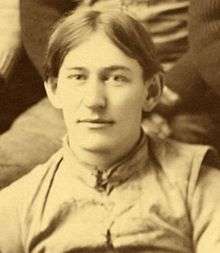Horace Dyer
Horace Levi Dyer (February 24, 1873 – July 3, 1928) was an American football player and attorney. He played at the halfback position for the 1894 Michigan Wolverines football team and was an attorney assigned to prosecute complex fraud cases from the 1900s to the 1920s.
Horace Dyer | |
|---|---|
 Dyer cropped from 1894 Michigan team photograph | |
| Born | Horace Levi Dyer February 24, 1873 |
| Died | July 1928 |
| Citizenship | United States |
| Alma mater | University of Michigan |
| Occupation | Attorney |
| Known for | Federal prosecutor of substantial fraud cases |
| Spouse(s) | Bettie Edgar, m. 1899 (d. 1901); Betty Wilcox, m. 1905 |
| Children | David (b. 1908); John (b. 1913) |
Early years
Dyer was born in Louisiana, Missouri, in 1873, the son of David Patterson Dyer, a federal judge and member of Congress. He received his preparatory education at the Stoddard School, Clark's Academy, and the Smith Academy, all in St. Louis, Missouri.[1]
University of Michigan
Dyer enrolled at the University of Michigan in 1890 and played as a halfback for the 1894 Michigan Wolverines football team. He helped lead the team to a 9-1-1 record, the best record in the history of the Michigan football team to that date.[2] He was five feet, seven inches tall, and weighed 167 pounds as a football player.[3]
Legal career
After receiving his LL.B. degree from Michigan in 1895, Dyer returned to St. Louis where he practiced law. He was an assistant city attorney from 1899 to 1902 and an Assistant U.S. Attorney starting in 1902. Dyer developed a reputation for prosecuting significant fraud cases and was often dispatched by the U.S. Department of Justice as a special prosecutor in such cases. Dyer's significant cases include the following:
- In 1905, Dyer was assigned to prosecute Joseph R. Burton, a U.S. Senator from Kansas. Burton was charged with accepting compensation from the Rialto Grain & Securities Company (a "get-rich-quick" concern), to represent Rialto before the post office department to prevent the issuance of a fraud order against the company. Dyer secured a conviction of Burton in the second trial of the matter (the first conviction was reversed by the U.S. Supreme Court). See Burton v. United States [4]
- In 1923, he was appointed Assistant Attorney General of the United States with responsibility to prosecute the leaders of the Egan Gang, also known as Egan's Rats. He led the prosecutions that resulted in the conviction and imprisonment of William Colbeck, "Chippy" Robinson, "Red" Smith, Oliver Dougherty, Stephen Ryan, "Featheredge" Schneider, Roy Tipton, "Red" Lanham, and Leo Cronin.[5]
- In 1926, Dyer was appointed as the special prosecutor in connection with an investigation and subsequent prosecution of Clarence Saunders, the founder of the Piggly Wiggly supermarkets, in connection with fraudulent sales of the company's stock.[6]
- In 1927, the U.S. Department of Justice sent Dyer to Tampa, Florida, to prosecute companies and individuals engaged in fraudulent real estate transactions during the Florida land boom of the 1920s.[7][8]
Dyer died at age 56 in July 1928 during the prosecution of Clarence Saunders in the Piggly Wiggly case. The cause of death was heart disease.[5] Following Dyer's death, an order from Washington, D.C., dismissed the case.[9][10]
Family
Burton married Bettie Edgar in 1899, and she died in 1901.[5] He married Betty Wilcox in 1905, and they had two sons, David (born 1908) and John (born 1913).[11] In a draft registration card completed at the time of World War I, Dyer stated that he was a lawyer with an office in the Central National Bank Building in St. Louis.[12] At the time of the 1920 United States Census, he was living in St. Louis with his wife and two sons, and was employed as an attorney.[13]
References
- The Book of St. Louisans. A.N. Marquis & Co. 1912. pp. 171–172.
- "1894 Football Team". University of Michigan, Bentley Historical Library.
- University of Michigan Palladium, vol. 37. University of Michigan. 1895.
- "Burton Again on Trial". Spokane Daily Chronicle. November 20, 1905.
- "Gang Wrecker Dead: Horace L. Dyer To Be Buried Tomorrow". St. Louis Post-Dispatch. July 5, 1928. p. 9.
- "Piggly Wiggly Stock Sales Investigated". The Southeast Missourian. February 14, 1926.
- "US Combats Florida Fraud". The Milwaukee Journal. March 13, 1927.
- "Act To End Frauds in Florida Reaty" (PDF). The New York Times. March 12, 1927.
- "Dismiss Piggly Wiggly Indictments" (PDF). The New York Times. July 12, 1928.
- "Saunders Is Freed: Piggly Wiggly Founder Has Case Dismissed". The Border Cities Star. July 12, 1928.
- Walter Barlow Stevens (1921). Centennial History of Missouri, vol. 5. S. J. Clarke. pp. 489–490.
- Draft Registration Card for Horace Levi Dyer. Ancestry.com. World War I Draft Registration Cards, 1917-1918 [database on-line]. Registration Location: St Louis (Independent City) County, Missouri; Roll: 1683858; Draft Board: 25.
- Census entry for Horace L. Dyer and family. Ancestry.com. 1920 United States Federal Census [database on-line]. Census Place: St Louis Ward 25, St Louis (Independent City), Missouri; Roll: T625_961; Page: 5B; Enumeration District: 511; Image: 525.